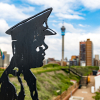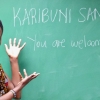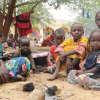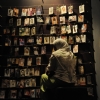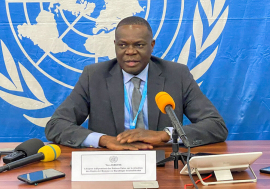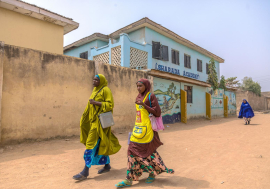Tell us a bit about yourself.
My name is Okwa Morphy from Nigeria. I am a United Nations Volunteer (UNV) with the UN Mission in South Sudan (UNMISS). I’m 49 years old and I hold a master’s degree in law. My area of expertise is human rights.
Where are you based?
I’m currently based in Yambio, the capital of Western Equatoria State in South Sudan. I work with the local community and other stakeholders to raise awareness about the importance of promoting and protecting basic human rights and dignity for all, especially women and children. I love what I do!
What are your responsibilities in the mission and what is your typical day like?
As a Human Rights Officer with UNMISS, my primary responsibilities include monitoring, investigating, documenting and reporting on human rights violations. This is a sensitive and challenging task which broadly includes monitoring parties to the ongoing conflict and how their actions (or inaction) affect civilians’ rights.
A typical day for me in Yambio involves getting to the office early to check for updates from the mission headquarters in Juba, then setting out to meet local interlocutors. I regularly visit detention facilities for monitoring purposes. The most difficult part of my day is when visiting the special protection units of local hospitals to monitor and record reported cases of sexual violence against women, which is sadly common in South Sudan.
How long have you been a UN Volunteer and how did you become one?
I joined UNMISS as a UN volunteer in August 2017. This is my first UN mission. I came across the UN Volunteers website almost by accident as I was surfing the internet in Nigeria one day. It caught my attention immediately as it encouraged professionals to serve as UN volunteers. I applied and was delighted when three months later I got an offer to serve in South Sudan. It was a dream come true for me career-wise, as it was an opportunity to do the work I am most passionate about and at an international level.
What did your family and friends back home think about your decision to leave your country and work for the UN peacekeeping mission?
My mother was very skeptical initially and didn’t understand why I wanted to leave the comfort of my home for a field mission in a country where there was active conflict, poverty and extreme hunger. My siblings were more supportive because they felt it was a unique opportunity but, I must admit, it took a great deal of convincing to get my mother on board. However, I’m happy to say that as time went by and having settled into my role, my family is very proud of me.
Tell us about the highlights of your services at your current peacekeeping mission:
The highlight of my experience at UNMISS is undoubtedly the opportunity I have to bring to light the violations of human rights and humanitarian law. It can be challenging, and even heartbreaking at times. But I feel that in some small way, I’m making sure that the injustices that have been perpetrated against civilians and vulnerable populations, particularly women and children, will eventually be addressed. In some way, I can say I’ve contributed to the justice system and its accountability, as well as the healing process for South Sudan.
What are the three things you like most about the mission and the country you are serving in?
My experience in Yambio has taught me to let go of my personal biases, keep an open mind and learn from my colleagues. It has enriched me tremendously and made me a better person and a better professional. I’m very grateful for this stint at UNMISS because it has taught me the value of patience and enabled me to widen my skillset considerably.
What I like about South Sudan is the people who are extremely welcoming and hospitable. Despite all the challenges they face every single day — struggling to feed their children, making a living, protecting their homes and families — you can feel their warmth the minute you meet them. Despite everything they have been through as a people and a country, the smiles on their faces are filled with hope. For me, this resilience in the face of such adversity is rare.
What part of your job do you find most challenging and why?
I get moved when speaking to people whose human rights have been violated in some way, or those who have survived sexual violence. I can see the trauma in their eyes and hear it in their voices. It’s always been the most difficult aspect of my job.
Do you think female peacekeepers serve as role models for the local population?
Absolutely! I think we provide local women and girls an empowering ideal to aspire to. When I am among the local communities in Western Equatoria many women come up to me and say that they hope their daughters will one day be like me. I tell them that their daughters can be like me if given the opportunity to go to school and complete their education. Overall, female peacekeepers from UNMISS are loved and respected among our host communities.
What would you say to young people considering a career in peacekeeping?
Peacekeeping isn’t for the faint-hearted. It brings out the humanity in all of us and is all about serving societies and individuals that need your help the most. So, if you really want your life to count for something larger than yourself, I’d strongly urge you to consider a career in peacekeeping. It’s not always easy to be away from family and loved ones and the working conditions can be difficult; but all the sacrifices you make are ultimately worth it!




